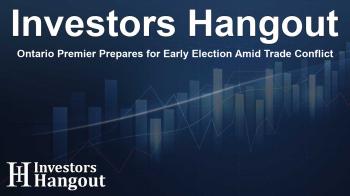Ontario Premier Prepares for Early Election Amid Trade Conflict

Ontario Premier Announces Early Election Plans
OTTAWA - The Premier of Ontario, the most populous province in Canada, is gearing up for an early election. Doug Ford, facing potential economic challenges due to tariffs threatened by U.S. President Donald Trump, believes it is essential to obtain a strong mandate to protect Canadian interests.
Reasons Behind the Early Election
Ford indicated that he would meet with the province's lieutenant governor to dissolve his government, facilitating an election that could take place as early as February. This proactive step contrasts with the previously planned election date set for June 2026. Ontario, representing a significant portion of Canada’s population, is also the nation's manufacturing core, making it vulnerable to tariff impacts.
The Impact of Tariffs
The proposed 25% tariff on Canadian imports could have severe repercussions for the province's economy. As Ontario is responsible for about 40% of Canada’s 40 million residents, businesses and families could face harsh realities should these tariffs be enacted.
Doug Ford's Stance and Actions
Ford has been vocal against the proposed tariffs, asserting that they pose a risk not just to the economy, but to communities and families. He has actively engaged in discussions and interviews, aiming to sway public opinion and inform the U.S. authorities about the potential consequences.
The Political Landscape
This move comes as Ford seeks a third consecutive majority mandate for his Progressive Conservative party. His previous victories in 2018 and 2022 have positioned him as a significant player within Ontario politics, though the unfolding trade situation may complicate his campaign.
Public Sentiment and Future Steps
Many in Ontario are apprehensive about the possibility of tariffs given the direct impact on local industries. As Ford prepares for the upcoming election, he emphasizes the need for solidarity and strength in tackling the challenges ahead. His commitment to fighting for Ontario’s interests is set against a backdrop of shifting political and economic landscapes, creating an atmosphere of urgency among stakeholders.
Frequently Asked Questions
Why is Doug Ford calling for an early election?
Doug Ford believes an early election is necessary to secure a strong mandate to confront potential tariffs from the U.S. that could impact Ontario's economy.
What are the implications of the proposed tariffs?
The suggested 25% tariffs on Canadian imports could severely affect Ontario's manufacturing sector and workers, creating economic strain.
How has Ford been preparing for this election?
Ford has been actively campaigning against tariffs, making public appearances, and pursuing discussions to inform and rally support against these trade challenges.
When will the elections take place?
The early election is expected to allow for voting on February 27, with the government being dissolved prior to that date.
What is Ford's political background?
Doug Ford is the leader of the Progressive Conservative party and has previously won two consecutive terms, seeking to secure a third majority government this election cycle.
About The Author
Contact Dominic Sanders privately here. Or send an email with ATTN: Dominic Sanders as the subject to contact@investorshangout.com.
About Investors Hangout
Investors Hangout is a leading online stock forum for financial discussion and learning, offering a wide range of free tools and resources. It draws in traders of all levels, who exchange market knowledge, investigate trading tactics, and keep an eye on industry developments in real time. Featuring financial articles, stock message boards, quotes, charts, company profiles, and live news updates. Through cooperative learning and a wealth of informational resources, it helps users from novices creating their first portfolios to experts honing their techniques. Join Investors Hangout today: https://investorshangout.com/
The content of this article is based on factual, publicly available information and does not represent legal, financial, or investment advice. Investors Hangout does not offer financial advice, and the author is not a licensed financial advisor. Consult a qualified advisor before making any financial or investment decisions based on this article. This article should not be considered advice to purchase, sell, or hold any securities or other investments. If any of the material provided here is inaccurate, please contact us for corrections.

